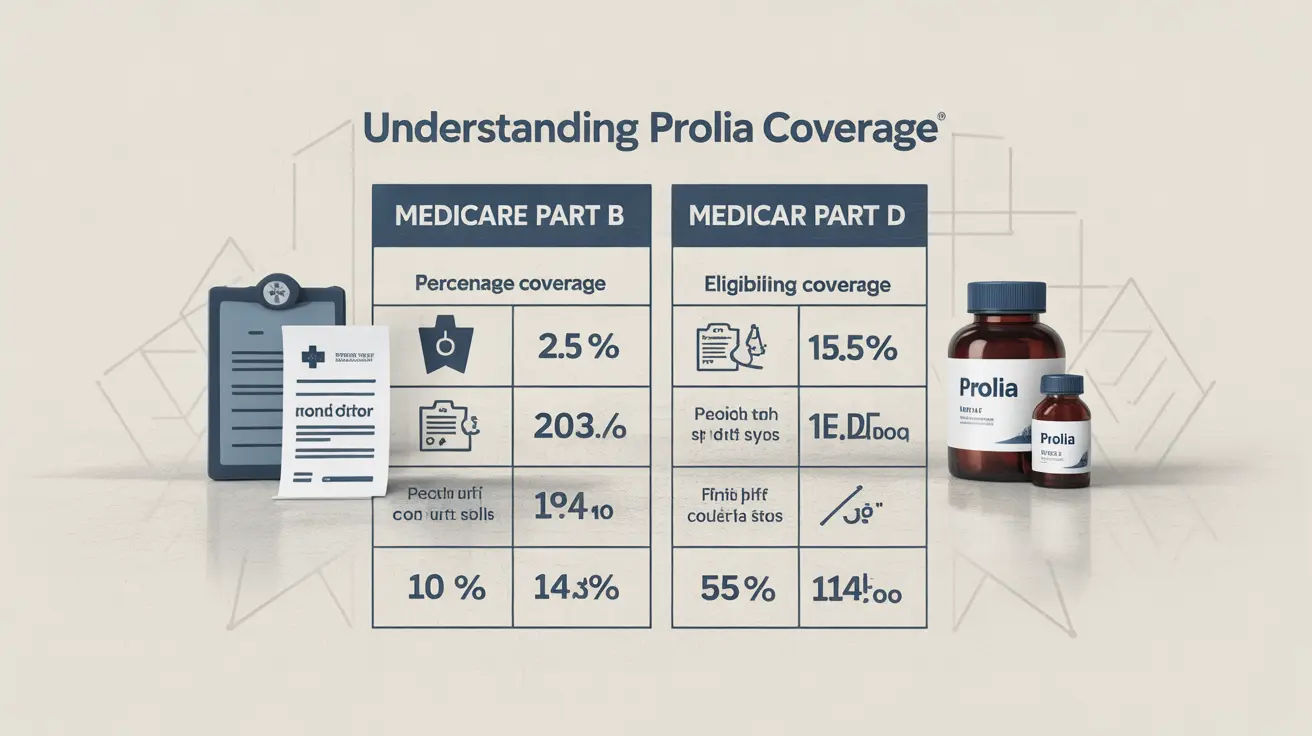For many Americans managing osteoporosis or bone health conditions, understanding the costs associated with Prolia injections under Medicare coverage is crucial for their healthcare planning. Prolia (denosumab) is a vital medication that helps prevent bone loss and reduce fracture risks, but its costs can vary significantly depending on your Medicare coverage type and individual circumstances.
This comprehensive guide will help you navigate the complexities of Prolia coverage under Medicare, including out-of-pocket costs, eligibility requirements, and important considerations for treatment planning.
Medicare Coverage Options for Prolia
Prolia injections can be covered under different parts of Medicare, each with its own cost implications and requirements:
Medicare Part B Coverage
Medicare Part B typically covers Prolia when administered in a doctor's office or outpatient setting. Under Part B, beneficiaries are generally responsible for:
- 20% of the Medicare-approved amount after meeting the annual deductible
- Additional costs for the administration of the injection
- Possible variations in coverage based on specific medical conditions
Medicare Part D Coverage
When Prolia is covered under Medicare Part D (prescription drug coverage), costs may include:
- Monthly premium payments
- Annual deductible (if applicable)
- Copayments or coinsurance amounts
- Possible coverage gaps ("donut hole")
Qualifying Medical Conditions
Medicare coverage for Prolia typically requires specific medical conditions and documentation, including:
- Osteoporosis with high fracture risk
- Bone loss related to certain cancer treatments
- Other qualifying conditions as determined by Medicare guidelines
Understanding Out-of-Pocket Costs
The actual out-of-pocket costs for Prolia can vary based on several factors:
Direct Medication Costs
- Average retail price without insurance: $1,000-$1,500 per injection
- Medicare coverage typically reduces costs significantly
- Supplemental insurance may further decrease out-of-pocket expenses
Additional Associated Costs
When calculating total treatment expenses, consider:
- Administration fees
- Required laboratory tests
- Supplemental medications (calcium and vitamin D)
- Regular bone density scans
Coverage Requirements and Documentation
To ensure Medicare coverage for Prolia, patients typically need to meet specific requirements:
- Documented medical necessity
- Prior authorization in some cases
- Regular bone density testing
- Compliance with calcium and vitamin D supplementation
Frequently Asked Questions
How much does a Prolia injection typically cost out-of-pocket with Medicare coverage?
With Medicare coverage, out-of-pocket costs for Prolia typically range from $100 to $400 per injection, depending on your specific plan and coverage type. This amount can be lower if you have supplemental insurance or qualify for additional assistance programs.
Which parts of Medicare cover Prolia injections and what are the differences in cost under Part B versus Part D?
Medicare Part B covers Prolia when administered in a medical setting, requiring a 20% coinsurance after meeting the deductible. Under Part D, coverage varies by plan, with costs depending on your specific drug plan's tier placement and benefit structure.
What medical conditions qualify for Medicare coverage of Prolia injections?
Medicare typically covers Prolia for osteoporosis with high fracture risk, bone loss related to certain cancer treatments, and other specific medical conditions. Your healthcare provider must document medical necessity and meet Medicare's coverage criteria.
How does Medicare handle the administration costs of Prolia injections given by healthcare professionals?
Under Medicare Part B, administration costs are typically covered at 80% after meeting your deductible. The remaining 20% is your responsibility, though this may be covered by supplemental insurance if you have it.
What are the requirements for Medicare coverage eligibility for Prolia, including supplements like calcium and vitamin D?
Medicare requires documented medical necessity, appropriate diagnosis, and compliance with treatment protocols, including regular bone density testing and maintaining prescribed calcium and vitamin D supplementation. Your healthcare provider must maintain proper documentation to support ongoing coverage.




